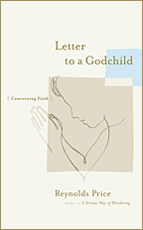Writer and university professor Reynolds Price calls himself a renegade Christian. Yet he has written of his faith in two volumes of memoir, a number of poems, a published response to a dying young man, and a study of the ethics of Jesus. Price continues his exploration in this sprightly volume containing the text of a letter addressed to the son of longtime dear friends who asked him to assume the role of honorary godfather. He states at the outset: "The Christian tradition is the one in which I continue to acknowledge and negotiate with that Creator, though since my early twenties I've done it so outside the walls of an organized church and in ways that might seem heretical to many."
Price shares a vision from childhood of the wheel of all being that incorporates nature, our own lives included, and of being beckoned into the Sea of Galilee by Jesus and healed of cancer. His spiritual exercises consist of private prayer, reading, meditation, reflecting his understanding that "the chief aims of any mature religious life are union with the will of God, as opposed to one's own will, and the finding of ways to assist other creatures on their own lonely routes."
Price admits to breaking at least five of the Ten Commandments and being, like most boys, a recovering pyromaniac. The photographs in the book are delightful, especially one in which the author appears as a youngster in the woods where he regularly restaged the Johnny Weissmuller Tarzan films, Polynesia fantasies, or anything to do with Native Americans. Price succeeds in providing his godson with a "navigable path through the endless and darkening thicket our lives so often seem to be." Convinced that God expects us to take good care of our bodies, he describes the human kidney is "as intricate and ultimately impressive a masterwork as the Grand Canyon, perhaps more so."
In the last chapter, Price shares some books that have been very meaningful to him including The World's Religions by Huston Smith, The Diary of a Country Priest by Georges Bernanos, and Marilynne Robinson's Gilead. And he concludes: "I assert once more the supreme value of music as the art which has most nearly delivered divinity to us."
